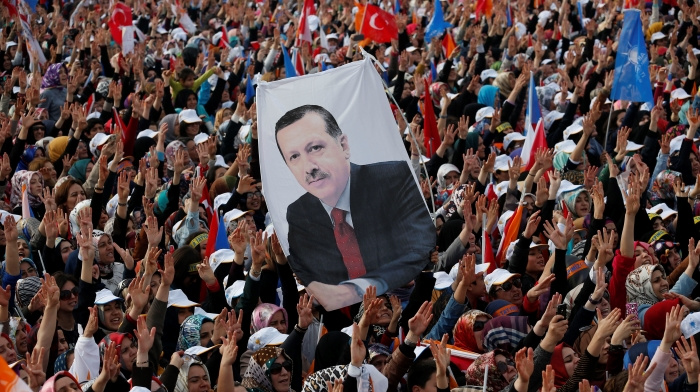Moving beyond Erdogan’s Charisma, a Necessity for Turkey

By: Sadeq Maleki
We are living in a world where the countries’ fate is no longer tied to their leaders. While Erdogan is a great man, Turkey is greater than him. He will leave power sooner or later, but Turkey will remain. The role of leaders has faded in powerful countries. In such countries development is a result of a systemic management. Reduction of leaders’ role in Turkey as a constituent of democracy has been an important step in getting closer to democratic standards.
Turkey’s political scene nowadays shows its distance with social and political indexes development. A look at Turkey shows the influence of Erdogan’s charisma on political equations in Turkey’s society. Albeit, this does not deny relative prevalence of democratic norms in Turkey.
While it is hard for most Middle Eastern regimes to tolerate opposition , and oppositions usually result in political purges within the system, in Turkey’s parliament there is a party which is known as the political branch of PKK. The capacity caused by practicing democracy has created ability for Ankara to accept the opposition and solve problems through dialogue. Subsequently, Turkey has been able to negotiate with PKK; a move that seems to have no parallel in neighbor countries.
Although Erdogan had a seminal role in uplifting the Kurdish community’s position within the Turkish society, today it’s him who has disturbed this trend. Such ups and downs show the difference between acting systemically and acting upon the whim leaders. Acting unstably, Erdogan has endangered the country’s political and economic situation, and eventually dragged Turkey in holding another election.
The election placed a shadow on Erdogan’s charisma, but this was not a failure that could prevent him from holding another election to reestablish power. Embracing the risk of a civil war, Erdogan also wants to replace the parliamentary system with a presidential system. Erdogan believes this could stabilize his role in Turkey’s path towards evolution and leave an indelible trace of his name.
But on November 1, 2015, the time of holding the premature election, this goal of Erdogan could turn out to be his next failure. Considering his role in the current crisis in Turkey, the blow of this failure could be even harder than the election held in June 7. In 1990, Erdogan himself was the victim of an authoritarian system, but today power has changed him in a way that he refuses to accept the democracy which empowered him at the first place. Turkey and Erdogan are still involved with their old habits. They will not experience a real democracy untill this old manner exist.
In today’s political game in Turkey, not only Erdogan’s, but also Abdullah Ocalan’s charisma has also been detrimented. Ocalan’s silence and his refusal to declare a ceasefire vis-à-vis Demirtaş’ wise actions have weakened his position. Demirtaş’ invitation of PKK to put down their weapons and end the crisis was timely and thoughtful action that created for him a peaceful and reasonable face between both Kurds and Turks. He also escaped the trap Erdogan had set to tarnish his moderate image.
As former Turkish president Süleyman Demirel once had said, 24 hour is a long time in Turkey, and today, with more than two months left to the elections, rarely an analysis could be definite. By creating crisis and then promising the salvation, and by getting close to the ‘hidden government’ and collecting Nationalists votes, Erdogan tries to come out as the winner of this historical period of Turkey. But this is a dangerous game and may endanger Turkey apart from the result of an election.
Democratic rules are universal and one could not have their own local narrative of it. Charismatic leaders are a barrier toward democracy. We should notice that if the upcoming election in Turkey leads to the fall of AKP, it will be regarded as Erdogan’s failure and will weaken his charisma. This event could help the establishment of a structured system Similar to Western countries and will have desirable outcomes for the region.
* Sadeq Maleki is a political analyst specializing in Turkish affairs.
Translated by: Parisa Farhadi

